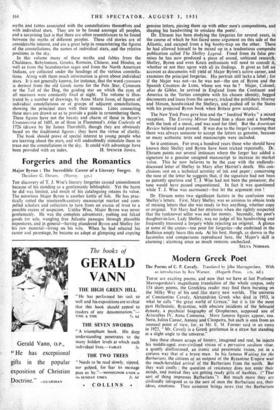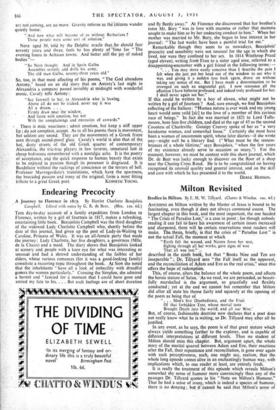Modern Greek Poet
THESE are exciting poems, and now that we have at last Professor Mavrogordato's magnificent translation of the whole corpus, only 154 short poems, the Greekless reader may find them bursting on the Milky Way of his soul like starry new worlds. The universe of Constantine Cavafy, Alexandrian Greek who died in 1933,' is what he calls " the -great world of Greece," but it is for the most part, Hellenistic, Byzantine, with obscure ineidents of the Seleucid dynasty, a psychical biography of Orophernes, supposed son of Ariarathes IV, Anna Comnena. More famons figures appear, too, Nero, Julius Caesar, Antony and Cleopatra, but each is seen from an unusual point of view, for, as Mr. E. M. Forster said in an essay, in 1923, " Mr. Cavafy is a Greek gentleman in a straw. hat standing at a slight angle to the universe."
Into these chosen scraps of history, imagined and real, he injects his middle:aged, over-civilised vision of a pervasive taedium vitae, a quietly disillusioned, an ironic and pessimistic vision, yet in a curious way that of a brave man. In his famous Waiting for the Barbarians, the citizens of an outpost of the Byzantine Empire wait the much-heralded arrival of the Barbarians from the north. But they wait coolly ; the question of resistance does not enter their minds, and instead they are getting ready gifts of baubles. (" That sort of thing impresses Barbarians.") But much more they are civilisedly intrigued as 'to the sort of men the Barbarians are, their ideas, emotions. Then someone brings news that the Barbarians
arc not coming, are no more. Gravity retUrns as the 'citizens wander quietly home :
And now what will become of us without Barbarians ? Those people were some sort of solution."
Nero aged 30, told by the Delphic oracle that/he• should fear seventy years and three, feels he has -plenty of 'time for " The evening hours in Achaian towns. And better still the joy of naked bodies "-
"So Nero thought. And in Spain Galba Assembles secretly and drills his army, The old man Galba, seventy-three years old."
So, too, in that most affecting of his poems, " The God abandons Antony," based on an old story that on Antony's last night in Alexandria a company passed invisibly at midnight with wonderful music, Cavafy tells Antony:
"Say farewell to her, to Alexandria who is leaving.
Above all do not be tricked, never say it was All a dream. . . .
Firmly draw near the window, And listen with emotion, but not- With the complainings and entreaties of cowards."
There is stoic weariness ; admit emotion, but keep a stiff upper lip ; do not complain, accept. As in all his poems there is movement, but seldom any sound. They are the movements of a Greek frieze seen through sound-proof glass. Cavafy's world is'also that of the hot, dusty streets of the old Greek quarter of contemporary Alexandria, the tric-trac players in low taverns, unnatural lust in cheap bedrooms remembered with a nostalgic ache. It is the poetry of acceptance, and the quick response to human beauty that exists to be enjoyed in passion though its possessor is disgraced. It is Baudelaire without the rackings of conscience or the terrors of hell. Professor Mavrogordato's translations, which have the spareness, the brocaded passion and irony of the original, form a most fitting































 Previous page
Previous page